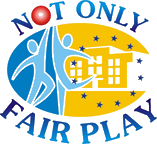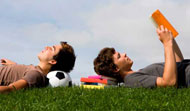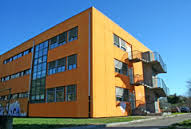
- Home
- Best
Practices - Toolkits
How to ... - Sport
Events - Guidelines
- Information
& Contacts - Project Management
A collection of student stories and initiatives about sport.
This section offers access to a collection of toolkits to promote sport at school.
-
 Physical Education Teachers
They are the main point of reference for students at school
Physical Education Teachers
They are the main point of reference for students at school
-
 Teachers
Teachers of all subjects can contribute to promote sport at school
Teachers
Teachers of all subjects can contribute to promote sport at school
-
 School Directors
Their support is a key element to promote sport at school
School Directors
Their support is a key element to promote sport at school
-
 Resources
A database of resources for teachers, PE teachers and school directors for the promotion of sport at school.
Resources
A database of resources for teachers, PE teachers and school directors for the promotion of sport at school.
Sporting events are organised in each partner country
Guidelines for policy makers willing to raise awareness on the importance of promoting sport in schools
Events
The Not Only Fair Play project has been promoted through conferences and articles.
Partnership
-
 Contractual Partners
From this section it is possible to access a description of each contractual partner of the Not Only Fair Play project.
Contractual Partners
From this section it is possible to access a description of each contractual partner of the Not Only Fair Play project.
-
 Schools
From this section it is possible to access information about the schools involved in the Not Only Fair Play Project in the 9 European countries involved.
Schools
From this section it is possible to access information about the schools involved in the Not Only Fair Play Project in the 9 European countries involved.
-
 Associated Partners
A number of associated partners officially joined the project in order to ensure the project sustainability by continuing to use the project deliverables over the next years.
Associated Partners
A number of associated partners officially joined the project in order to ensure the project sustainability by continuing to use the project deliverables over the next years.
This section of the Not Only Fair Play portal provides administrative information for the project contractual partners and for the European Commission, and is password protected.
Case Studies
Homepage > Best Practices > Case Studies

Collection of case studies of school students who succeeded in balancing school career with the passion for sport.
STUDENT INFORMATION
 Name of the student:
Name of the student: Country:
Country: Sport:
Sport:SCHOOL INFORMATION

 Name of the School:
Name of the School: School Typology:
School Typology: Address:
Address: Tel:
Tel: Fax:
Fax: Web site:
Web site: E-mail:
E-mail:CASE STUDY
 The Context:
The Context:I've always been supported by my family, my father in particular, and this, step by step, created a real passion for waterpolo.
Hopefully, our school has very good sport equipment: it has a gym and a football field, which is not very common.
Maybe the teaching of Physical Education at school must be reconsidered in different ways. I think that nowadays in Italy young people are not really supported to practice sport activities, unless they have very supportive families. In addition, most guys are inclined to practice football, as it's the most popular sport.
There are a lot of, maybe too many, boys and girls who have never praticed any sport.
 Balancing Sport and Education:
Balancing Sport and Education:A strong resolution is necessary.
I usually spend little time on studying, because our vocational school requires a long time also for the participation to events and workshops.
Every day I spend about two hours or sometimes more on sport, usually in the afternoon or in the evening, in order to prepare the weekly match. Waterpolo is a team sport, so we have to train during the week for the match, listening to the coach and forming relationships with other players.
Probably my school performances would have been better without sport activity, but I'm not completely sure. The balance between school/sport obliges me to keep to fixed timetables, which I'm forced to respect.
It's difficult to think about a way to successfully balance school/sport, especially here in Italy, where school always comes first. Teachers should be more understanding and sympathetic.
My suggestion to achieve a better balance between school career and sport activity is that here in Italy we should learn something from other countries, where colleges with good sport infrastructures and equipment welcome those students who want to study and practice sport at competitive levels.
Another suggestion could be that of giving more relevance to sport, we cannot consider only football or similar for importance.
 Future Perspectives:
Future Perspectives:I would like to get my final degree at school ( I am attending the fourth year so I am near…)
I hope I can continue to play waterpolo, increasing my performances. In the future I'll probably think about a job, so I will balance work and sport, as it's possible.
